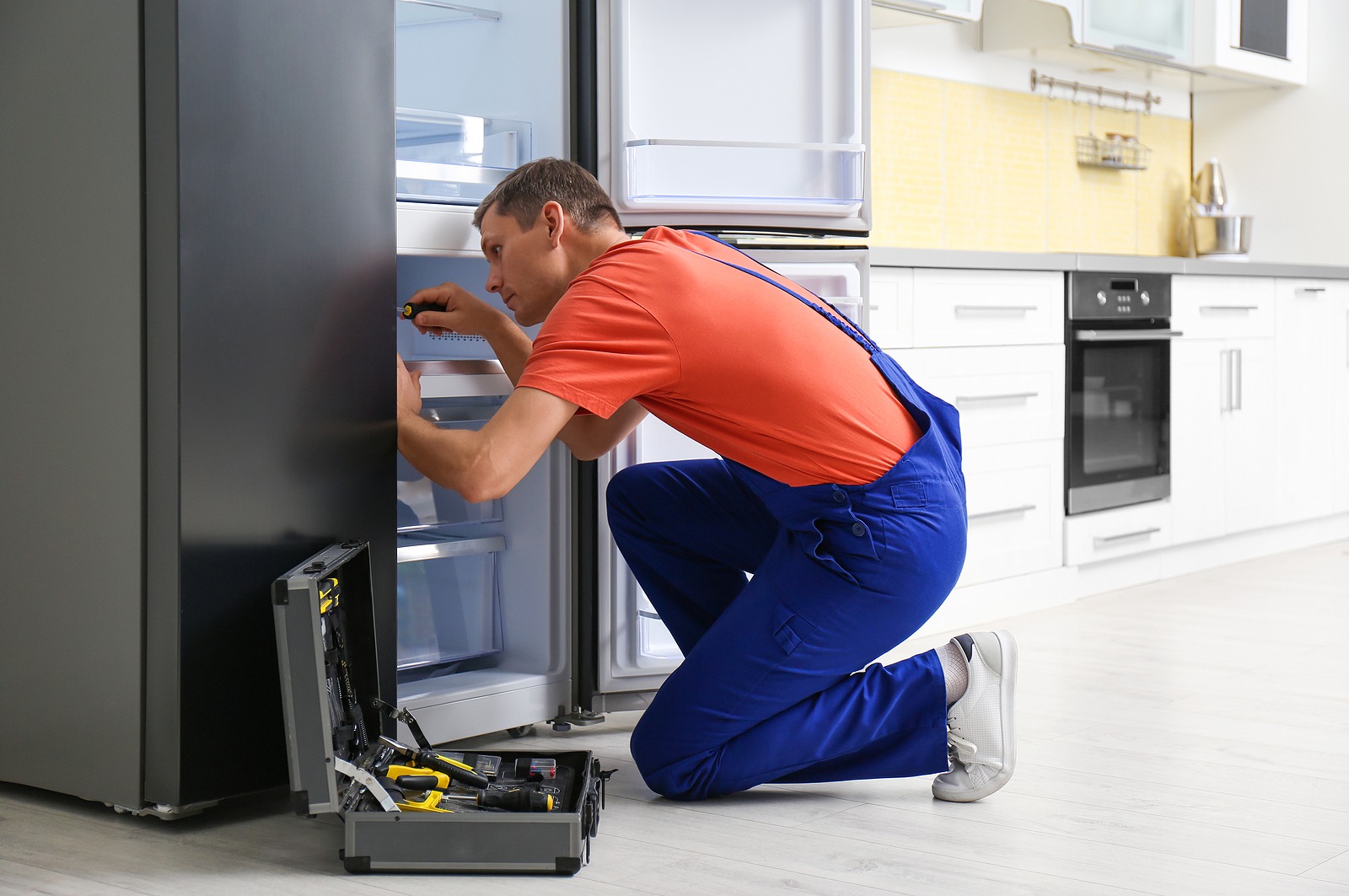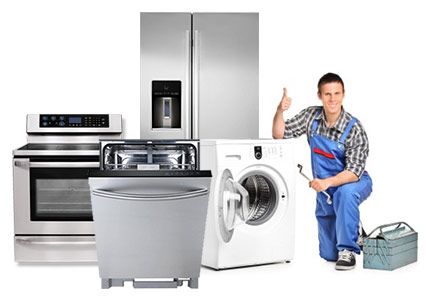Pros, Cons & Best Practices – Dependable Refrigeration & Appliance Repair Service Washing Machine Repair
Pros, Cons & Best Practices – Dependable Refrigeration & Appliance Repair Service Washing Machine Repair
Blog Article
The Ultimate Overview to Understanding Device Repair Work at Home
When your fridge stops cooling or your oven refuses to warmth, it can really feel frustrating. Understanding appliance repair at home can conserve you money and time. You'll find out to recognize signs, make use of necessary tools, and comply with an organized troubleshooting process. Before you start, there are essential security preventative measures you need to take right into account. What are one of the most common troubles, and how can you fix them? Let's check out the basics.
Usual Home Appliance Problems and Their Symptoms
When your home appliances start acting up, it's necessary to acknowledge the indications early on. Disregarding them can cause larger issues and pricey fixings. For example, if your refrigerator isn't cooling down appropriately, you may notice cozy areas or condensation forming. This might indicate a failing compressor or an obstructed vent.Your dish washer may show problems through unclean dishes or uncommon sounds during cycles. If you hear grinding or clanking, it's time to investigate.A washing machine that will not spin or drain pipes can leave you with soggy laundry, recommending a stopped up drain or a malfunctioning pump.Lastly, if your stove's temperature appears off or it takes permanently to preheat, you may be handling a defective thermostat. By remaining sharp to these signs, you can resolve concerns before they rise right into major repair work.
Vital Tools for Device Repair Work
When you're taking on device fixings at home, having the right tools is necessary. Basic hand tools like screwdrivers and pliers will help you disassemble and repair different home appliances, while electrical testing devices guarantee you're functioning securely with electrical wiring. Allow's discuss what you need to begin on your repair work trip.
Fundamental Hand Devices
Having the right tools is vital for efficient device repair service at home. Begin with a trusted screwdriver collection, consisting of both flathead and Phillips types, as screws prevail in device setting up. Pliers are likewise crucial; they assist with gripping, twisting, and reducing wires or small components. A set of needle-nose pliers can reach difficult situations conveniently. You'll require a good flexible wrench for tightening up or loosening nuts and screws. An energy knife comes in handy for cutting via packaging or insulation. Do not neglect a strong workbench or surface to securely arrange your devices and parts. With these basic hand tools, you'll be well-prepared to deal with most device repair services that come your means.
Electrical Testing Tools
Alongside standard hand tools, electric screening tools play an important role in device repair work. These devices help you detect electrical concerns and assurance appliances operate securely. A multimeter is essential; it determines voltage, existing, and resistance, allowing you to pinpoint issues promptly. A non-contact voltage tester is another must-have, letting you identify live wires without making straight call, improving your safety. Clamp meters are fantastic for determining present circulation in cords without separating them, saving you time and initiative. In addition, circuit testers can rapidly inspect if electrical outlets are operating properly. By using these gadgets, you'll streamline your troubleshooting process and enhance your repair service skills, making home appliance upkeep a whole lot simpler.
Step-by-Step Guide to Diagnosing Appliance Issues
When your appliance acts up, it can be aggravating, but identifying the issue doesn't need to be frustrating. You'll find out to recognize common problems and use efficient fixing strategies. Let's go through the actions to get your device back in working order.
Typical Device Troubles

Troubleshooting Strategies Clarified

Repairing Significant Cooking Area Home Appliances: A Closer Look
Have you ever wondered exactly how to tackle usual issues with your cooking area devices? Repairing significant kitchen home appliances like refrigerators, stoves, and dish washers can be easier than you believe. Start by recognizing the trouble-- whether it's a fridge not cooling down Full Report or an oven that won't warm. Commonly, an easy reset or examining the source of power can fix the issue.For refrigerators, clean the condenser coils and examine the door seals. If your oven's not home heating, inspect the burner and thermostat. Dishwashers could just need a tidy filter or a reset to get them back at work. Always disconnect the home appliance before diving right into fixings to assure your safety.Don' t fail to remember to seek advice from the individual handbook for certain troubleshooting tips associated with your model. With a little bit of patience and the right devices, you can confidently deal with device repair services and save cash in her latest blog the process!

Repairing Washing Equipments: Tips and Techniques
When your laundry devices start breaking down, it can feel frustrating, but repairing them does not have to be a hassle. Start by inspecting the power supply. Confirm the home appliance is connected in and the outlet is operating. Next, check the door or cover switch; a damaged switch can prevent the machine from operating.For washers, if it's not spinning, inspect for unbalanced tons. Rearranging the clothes might resolve the problem. If your clothes dryer isn't home heating, clean the dust filter and examine the vent for blockages.Listen for unusual noises; they can suggest an issue. If your device is dripping, examine the hoses for cracks or loose connections. File any type of mistake codes shown on electronic displays, as they can lead you in recognizing the concern. Seek advice from the customer guidebook for details fixing ideas related to your model.
Security Preventative Measures to Take Throughout Repair works
Prior to you begin any home appliance repair work, it's vital to focus on safety to avoid accidents or injuries. First, unplug the device or shut off the circuit breaker to ensure no power reaches it while you function. Usage shielded devices to lessen the risk of electric shock. Wear security goggles and gloves to protect on your own from sharp sides or debris (Washer dryer repair service Dependable Refrigeration).Make specific your workspace is clean and well-lit, so you can see what you're doing. Maintain youngsters and pets away from the location to avoid disturbances and prospective hazards. If you're taking care of gas appliances, be additional cautious; check for leakages prior to proceeding.Take your time, and don't hurry through repair services. If you really feel unsure about any type of action, it's better to stop briefly and study than to think. Adhering to these safety measures will certainly help produce a more secure atmosphere for your do it yourself appliance repair service task
When to Call a Professional for Assistance
Just how do you know if it's time to employ a professional for appliance repair services? If you have actually attempted fundamental troubleshooting without success, it's a clear indication. For instance, if your home appliance still will not begin or reveals uncommon noises after resetting it, don't wait to look for expert help.When you observe leakages, smoke, or melting smells, prioritize security and call a pro quickly. These issues can result in even more significant damage or position risks to your home.Also, if your home appliance is under guarantee, calling an expert is usually the most effective course. They can assure that repair services will not nullify your warranty, saving you cash in the lengthy run.Finally, if you're not sure or unpleasant with complicated repair work, it's a good idea to leave it to the specialists. Bear in mind, dealing with challenging problems without the best competence can cause costly mistakes. Trust fund an expert when doubtful!
Frequently Asked Inquiries
Exactly How Can I Avoid Device Issues in the Future?
To avoid appliance troubles in the future, larrys appliance repair you must carry out regular maintenance, look for deterioration, clean filters, and prevent overloading. Staying proactive will certainly assist extend their lifespan and maintain them running smoothly.
What Are one of the most Typical DIY Device Repair Work Mistakes?
You might ignore safety preventative measures, skip fixing steps, or utilize incorrect tools when trying DIY home appliance repairs. Rushing the procedure or ignoring maker standards can lead to more substantial problems and pricey blunders. Stay individual and informed!
Exactly how Do I Know if a Component Demands Replacement?
You can inform if a component requires replacement by inspecting for uncommon sounds, leaks, or inconsistent efficiency. If the device struggles to operate properly or reveals noticeable damage, it's likely time for a replacement.
Can I Utilize Generic Components for Device Services?
Yes, you can utilize common components for device repair work, however identify they work - Kenmore Dryer Repair Oro Valley Dependable Refrigeration & Appliance Repair Service. Common components may conserve you money, however they might affect performance or longevity, so evaluate your choices very carefully prior to making a decision
What Guarantees Cover Home Appliance Fixes?
A lot of home appliance warranties cover repair work for producing flaws, however they typically omit damages from abuse. Examine your service warranty terms meticulously, as some could require using certified service technicians and original components for protection to remain valid.
Report this page